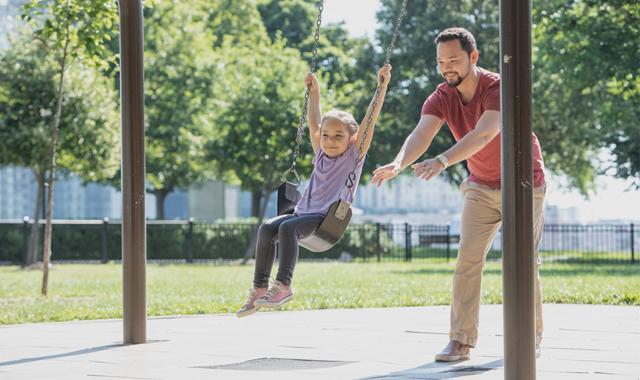Get balanced information about diseases and the vaccines that prevent them.
Many diseases that were once common are rarely seen today because of vaccines. That is why it can be easy to think these diseases are not serious and vaccines are not needed anymore. But these diseases are serious. And they are not gone. They are just kept in check by vaccines. If we stop vaccinating, they will come back.source: 1,source: 2 Many children will get seriously sick, and some will die. That’s why more than 92% of parents ensure their children are up to date on their vaccines before they start kindergarten.source: 3
Quiz: How well do you know the risks?
Question 1 of 5: How many childhood deaths have routine vaccines prevented?
Correct
Very good!
Incorrect
No, vaccines have saved many more children!
Vaccines are expected to prevent more than 1 million deaths among children in the United States who were born between 1994 and 2023. That’s more than the entire population of Denver, Colorado.
Question 2 of 5: What diseases have vaccines wiped from the face of the earth?
Correct
Yes! Before a vaccine was used to eradicate smallpox, 3 out of 10 people who had it died.
Incorrect
Good try, but only smallpox has been wiped from the face of the earth. Before a vaccine was used to eradicate smallpox, 3 out of 10 people who had it died.
But we are also very close to eradicating polio. Polio paralyzed almost 21,000 people in the U.S. in 1952 alone. Polio is rare in the United States, but it still exists in a few countries in Asia and Africa. Remember, we still need to vaccinate until polio is gone everywhere, because viruses, just like people, travel.
Question 3 of 5: What are the risks of serious side effects happening after vaccination?
Correct
Yes! Generally, only 1–2 vaccine doses in 1 million will result in a severe allergic reaction.
Incorrect
No, the risk is much, much smaller. Generally, only 1–2 vaccine doses in 1 million will result in a severe allergic reaction.
To put that in perspective, you have a 1 in 15,300 chance of being struck by lightning in your lifetime and a 1 in 46,744 chance of dying from a hornet, wasp, or bee sting—both much more likely than having a severe allergic reaction from a vaccine.
It’s important to understand the true risk of something to make an informed decision.
Question 4 of 5: If one person has measles, how contagious is it in people who are not immune?
Correct
Correct! Measles is one of the most contagious diseases in the world. If 1 person has it, 9 out of 10 people close to that person will also get measles if they aren't protected.
Incorrect
No, measles is one of the most contagious diseases in the world. If 1 person has it, 9 out of 10 people close to that person will also get measles if they aren't protected.
Measles can live in the air for up to 2 hours after an infected person leaves an area. It can be a very serious disease:
- 1 in 5 unvaccinated people who get measles will be hospitalized
- 1 in 20 unvaccinated children who get measles will get pneumonia
- Unvaccinated pregnant women who get measles may have a premature or low birth weight baby
Question 5 of 5: Why do we still need to vaccinate for whooping cough?
Correct
Yes! All the answers are correct. Whooping cough can be very serious for babies.
Incorrect
Actually, all the answers are correct. Whooping cough can be very serious for babies.
Thanks to most kids getting whooping cough vaccines, cases of the disease have decreased more than 75%. And getting vaccinated while pregnant passes protection to the baby. This helps protect the baby before they’re old enough to get their own vaccine.
Thanks for participating.
Want to brush up on your knowledge?
Browse this site to learn more.
You scored

Share the facts
Spreading the truth saves lives, so use our resources to help parents understand how vaccines work, why they’re safe, and how they help protect kids.
Vaccine safety
Vaccines go through rigorous testing and monitoring to ensure they are safe for your child.source: 24,source: 25,source: 26
Vaccine science
The science behind vaccines helps us understand how they work and why they are effective.
Vaccine schedule
Sticking to the vaccine schedule helps protect your child against more than a dozen diseases.source: 27,source: 28
Sources
- FDA: Vaccines Protect Children From Harmful Infectious Diseases
- American Academy of Pediatrics: 14 Diseases You Almost Forgot About Thanks to Vaccines
- CDC: Vaccination Coverage and Exemptions among Kindergartners
- CDC: Chickenpox Vaccine Saves Lives Infographic
- CDC: COVID-19 Vaccine Frequently Asked Questions
- HHS: Diphtheria
- CDC: Flu Vaccine Safety
- CDC: Pink Book: Hepatitis A
- HHS: Hepatitis B
- HHS: Hib (Haemophilus Influenzae Type B)
- CDC: Human Papillomavirus (HPV): Reasons to Get Vaccinated
- CDC: Measles Vaccination
- CDC: About Meningococcal Vaccination
- CDC: Mumps Cases and Outbreaks
- CDC: Pink Book: Pneumococcal Disease
- CDC: Polio Vaccine Effectiveness and Duration of Protection
- CDC: Achievements in Public Health, 1900-1999 Impact of Vaccines Universally Recommended for Children -- United States, 1990-1998
- CDC: RSV in Infants and Young Children
- CDC: Rotavirus Vaccination
- CDC: Pink Book: Rubella
- HHS: Rubella (German Measles)
- CDC: Tetanus Surveillance and Trends
- CDC: Pink Book: Pertussis
- CDC: How Vaccines are Developed and Approved for Use
- FDA: Vaccine Facts: Why You and your Family Need Vaccines
- FDA: Vaccine Development – 101
- CDC: Reasons to Follow CDC’s Recommended Immunization Schedule
- CDC: Child and Adolescent Immunization Schedule by Age


